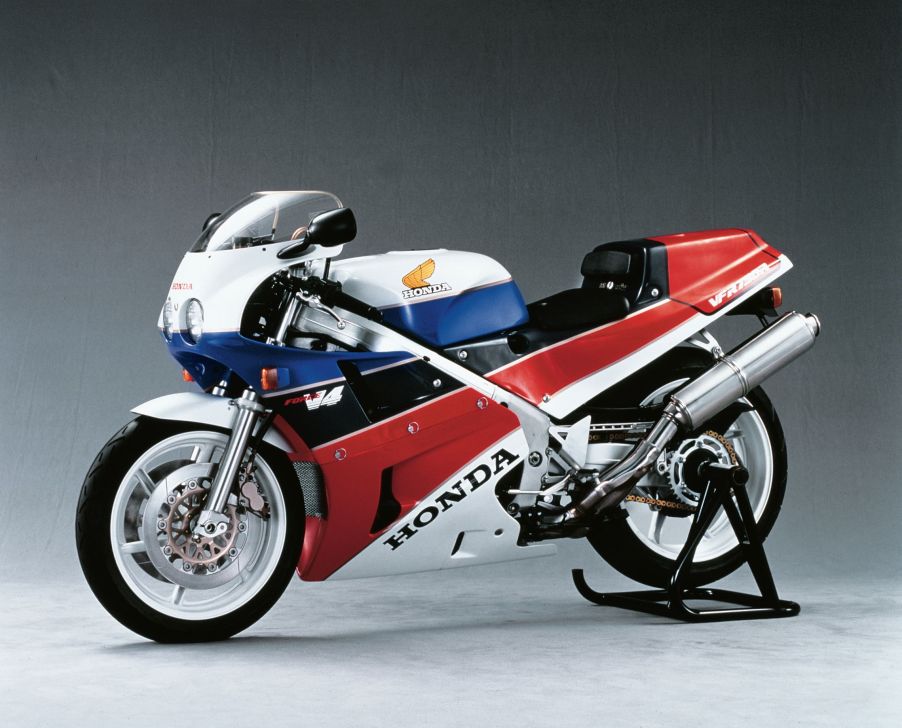
Is the Iconic Honda RC30 Still a World-Class Superbike?
Superbikes aren’t merely fast motorcycles, though speed is certainly a designation requirement. Whether modern or classic, these bikes represent the peak of riding tech and often climbed that peak themselves. But just like with older supercars, time and improved technology often take the shine off of aging superbikes’ performance. However, some old legends still sparkle today. Is the Honda RC30 one of those, though?
The RC30: a homologation World Superbike racer and distillation of Honda spirit

Vintage high-performance Hondas hold a special place in many motorcycle riders’ hearts. And that especially holds true for racing bikes like the RC166. These machines reflect “passion fueled by obsession, precision as moral imperative, the final iteration as the only iteration,” Cycle World rhapsodizes. And if you’re looking for “peak Honda,” Motorcyclist says, the Honda RC30 is it.
Officially called the VFR750R, the Honda RC30 was built to satisfy the then-new World Superbike Championship’s homologation requirements. In essence, it was a road-legal version of a fully-fledged racing bike, much like Ducati’s Desmosedici RR. And speaking of, the RC30 is similar to another one of the Italian company’s bikes, the Mach 1. Not in terms of shape or capacity, but because both bikes were genuine racing machine copies.

Although the Honda RC30 superficially resembles the contemporary VFR750F Interceptor, the bikes share few if any parts. More importantly, the RC30 isn’t an upgraded street bike, Motorcycle Classics explains. It’s the product of a true price-no-object approach to running a racing program. And that shows in every aspect of its design.
Like the Interceptor, the Honda RC30 has a V4. But it’s a unique liquid-cooled 748cc V4 with gear-driven cams, titanium connecting rods, and magnesium valve covers. It’s a stressed member of the frame with a 12,500-RPM redline linked to a model-specific six-speed transmission. And it came standard with a slipper clutch—in 1988.
But wait, there’s more. The Honda RC30 has an aluminum fuel tank and a single-sided swingarm to speed up wheel changes at the track. Its body panels are handmade out of carbon fiber and Kevlar and feature quick-release fasteners. The Showa suspension is fully adjustable and the hinged fork bottoms keep the brakes in place while allowing quick wheel swaps, Iconic Motorbike Auctions explains.
It might be dated, but the Honda RC30 is still a magic superbike legend, RevZilla says
In road-going form, the Honda RC30 makes 86 hp at the rear wheel, MC reports. That doesn’t sound like much, but then, it only weighs 488 lbs fully fueled. That’s roughly 10 pounds lighter than the early Suzuki GSX-R750, IMA says. Plus, in unrestricted racing form, the V4 makes up to 118 hp.
With all this tech and Fred Merkel at the helm, the Honda RC30 won the inaugural 1988 World Superbike Championship. Then it won again in 1989. And it continued scoring victories at events all over the world, including several at the Isle of Man TT.
Today, some parts of the Honda RC30 are a bit antiquated, RevZilla says. The disc brakes lack cross-drilled rotors, for one, and are axial- rather than radial-mounted. As a result, they’re somewhat weak. Plus, compared to a modern sportbike or superbike, the RC30’s steering is rather slow.
But for all that, riding a Honda RC30 is still “the stuff dreams are made of,” RevZilla reports. Its ergonomics are surprisingly modern, and while the seat is rather low, it’s fairly comfortable. The V4 idles and pulls away from a stop without histrionics or excessive vibrations. And the bike doesn’t feel heavy or slow, only stable.
The true magic, though, comes when you truly push the RC30. The raw visceral exhaust makes you feel like you’re in the TT, and the throttle response “is perfect,” RevZilla gushes. Whether it’s the clutch lever, shifter, throttle, or handlebars, everything about the RC30 feels precise. It might be old, but this superbike can still dance like the best.
What’s this icon worth today?
Unfortunately for your wallet, the Honda RC30 was and is still priced like some of the best superbikes. Honda only made 3000 examples; the US received 316 bikes from that run, RideApart says. That rarity, combined with the RC30’s pedigree and the growing interest in ‘80s and ‘90s machines, means prices have risen drastically in recent years.
In 1990, the Honda RC30 started at roughly $15K in the US, the equivalent of $31,330 today. But a good-condition example these days costs about $40K, Hagerty says. And in 2018, a 14-mile example set records when it sold at Bonhams for $92,000. Though as of this writing, IMA has an example listed for $22,100 with four days left in the auction.
The good news is that Honda now offers new parts for RC30 owners, removing some repair anxiety. And that means, if you can get in the saddle, you can ride your still-super bike even more.
Follow more updates from MotorBiscuit on our Facebook page.


